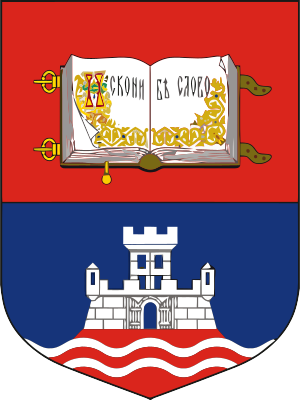 401-500
401-500 


The University of Belgrade is the oldest and the largest university in Serbia. Its predecessor was a Higher School founded in 1808 that in 1838 became a Lyceum. In 1905, by a special decree of the then Serbian Government, the Lyceum became the University of Belgrade. It started its institutional life with three schools – philosophy, law and engineering. The fact which speaks most about the significance of the University of Belgrade in the Balkans is that all state universities in Serbia and several universities in the region were founded by the University of Belgrade, while private universities in Serbia were founded by the teaching staff educated at the University of Belgrade. Nowadays, the University of Belgrade consists of 31 schools, 11 research institutes, and 8 centers in the fields of vital importance to the functioning of the University, such as: career development, technology transfer, quality assurance, strategic management and planning, work with physically challenged students and Computer Center. The University Library “Svetozar Marković”, with more than 3,500.000 volumes, is also a member of the University. The University disposes of 11 endowments provided by affluent citizens of Serbia and 7 funds for supporting 200 best students of the University of Belgrade. On the occasion of celebrating 200 years of existence of the University of Belgrade and higher education in Serbia, the organization of former students of the University of Belgrade – Alumni of the University of Belgrade – was founded in 2008. Besides connecting former students of the University, this organization aims to contribute to the promotion of quality of studies at the University of Belgrade. The University of Belgrade provides training in traditional and some new emerging disciplines. Its schools are divided into four groups, according to the disciplines they teach: - Sciences and Mathematics- Technology and Engineering Sciences- Medical Sciences- Social Sciences and Humanities. As the largest learning community in this part of Europe, with 432 study programs, of which: 172 undergraduate, 194 master, 66 doctoral studies (with 712 succesfully defended doctoral theses), 94,458 students (of which 4,171 international) and 6,174 academic and research staff, 3,105 papers on SCIE and SSCI lists, numerous publications and scientific and research projects, the University of Belgrade has unique responsibilities and opportunities toward the society. One of its most important roles is to help development of the society through the affirmation and promotion of education and creation of new intellectual partnerships within the University, as well as within the society as a whole. Therefore, it has a very long tradition in academic and cultural exchange, as well as inter-university and international cooperation with universities within the country and abroad. The University of Belgrade has also a great experience in cooperation with international organizations focusing on higher education. This is clearly shown by the bilateral agreements of cooperation concluded with more than 180 universities on every continent, membership in the European University Association (EUA), the Network of Universities from the Capitals of Europe (UNICA), the Black Sea Universities Network (BSUN), the Danube Rectors' Conference (DRC), the University Network of the Adriatic and Ionian Basin (UNIADRION), Association des Universites Francophones (AUF) and others. Students of the University of Belgrade are members of numerous international organizations: Board of European Students of Technology (BEST), Electrical Engineering Students European Association (EESTEC), Association Internationale des Etudiants en Sciences Economiques et Commerciales (AIESEC), European Students of Industrial Engineering and Management (ESTIEM), Association des Etats Généraux des Etudiants de l’Europe (AEGEE), Center for Student International Cooperation (CMSS), European Law Students' Association (ELSA) and South Eastern European Youth Network (SEEYN) and many more. The University also maintains contacts with rectors' conferences in individual countries, with academic associations and teacher and student exchange associations. In addition, the Rector of the University of Belgrade is the President of Conference of Universities of Serbia, which consists of 17 accredited state and private universities. In 2008, the University of Belgrade became an active partner in the ERASMUS MUNDUS cooperation scheme that provides opportunities for academic mobility from the Western Balkans to the EU and vice-versa. The University of Belgrade takes active part in European programs as a grantholder and partner in many projects (Horizon 2020, Erasmus+, TEMPUS, FP7, CIP, LLP, Erasmus Mundus, EUREKA, COST, IPA etc.). Academic Artistic Associations of the University of Belgrade, ‘Branko Krsmanović’ and ‘Španac’, also play an active role in students’ life, helping them express their artistic talents in the area of performing arts. Students of the University of Belgrade are very active in the field of sports. This is illustrated by the fact that they have won numerous medals on Summer and Winter Universiades, and one of them – the 25th Summer Universiade – was hosted by the University of Belgrade. During the two centuries of its existence the University of Belgrade has served its people, and its former students and teachers have greatly contributed towards the development of cultural, scientific, educational, political and economical life of our country. The University of Belgrade is prepared to maintain and improve its position as the leading higher education institution both in the country and in the region. The University is striving to preserve what is worthy in its tradition and what makes it recognizable as a national brand, but has also expressed its readiness to adapt to the challenges of the present day. Having signed the Bologna Declaration, the University of Belgrade has shown its commitment to joining European Higher Education Area in the nearest future. For more information about the University of Belgrade please visit http://www.bg.ac.rs
 401-500
401-500 
| Subject | Rank |
|---|---|
Metallurgical Engineering | 76-100 |
Food Science & Technology | 101-150 |
Veterinary Sciences | 101-150 |
Mathematics | 151-200 |
Chemical Engineering | 201-300 |
Energy Science & Engineering | 201-300 |
Water Resources | 201-300 |
Biological Sciences | 201-300 |

